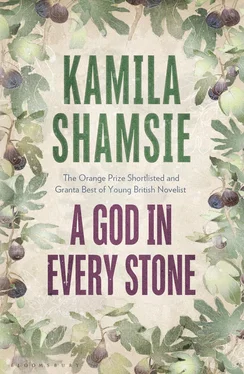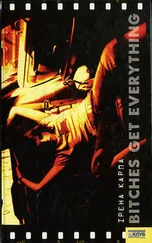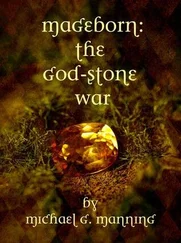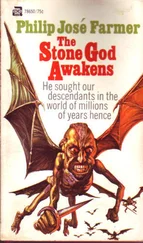The fluttering of the blinds, the dripping of water which streaked the window and created the illusion of rain — these sounds grew louder, magnified by the silence between the man and the woman which was entirely different to the silence which had preceded it. Qayyum cleared his throat, leaned forward.
— Yes, I am Pathan.
He never thought of himself that way before the Army. His great-grandfather had left the Yusufzai lands decades before Qayyum was born, and so Qayyum was a Peshawari, a city-dweller, with Hindko not Pashto as his first language. Those Pashtuns! his grandfather liked to say, with the superior air of a man who believes he has escaped into a better destiny. But in the Army Qayyum was told he was a Yusufzai of the 40th Pathans and, in the company of the other Yusufzai of the regiment who called him their kinsman and said the air of Peshawar couldn’t thin Yusufzai blood, he learned to think of himself as just that. Why, in the Army, would you be anything but a Pathan — the word itself exploded from the lips of the English officers like a cannonball, straight and true.
— You’re going to Peshawar?
— Yes. My home.
— Have you ever heard of Scylax?
— I don’t know any Englishmen in Peshawar.
She laughed at that, and he wondered if this Scylax was a Scot, like Captain Dalmohay. He, Allah rest his soul, had understood that to the Indians all the British were English, and wouldn’t have made a man feel foolish for not knowing an English name from a Scottish one even though he could tell Dogra from Pashtun, Hindu from Muslim.
— I’m sorry, I’m laughing at myself. Did you learn English at school?
— The Army.
Until now the Englishwoman’s gaze had been remote, as if she were trying too hard to pretend there was nothing of particular interest in Qayyum’s face, but now she looked directly at the permanently closed eyelid.
— Mesopotamia or France?
— France. Belgium.
— Ypres?
His nod was brief, asking for the conversation to go no further. The Englishwoman stood up, rolled down the blinds, and for a time there was quiet and fragrance and shade. When she spoke again, her voice was different.
— There were ferocious arguments in London when it became known an Indian division was being deployed to France. But the old military men who had served in India insisted the loyalty of the Indian troops to the Crown was beyond question.
Beyond question. It wasn’t a phrase Qayyum knew. Beyond question. If question was the Allied line, the loyalty of Indian troops was somewhere beyond, all the way across the field without cover and up the slope where the German gunners waited.
He stepped out of the compartment, into the corridor.
The light coming through the gaping compartment door turned harsh. Viv looked out through the open doorway, through the windows on the far side of the carriage. A barren plain scattered with slate, and rock the same reddish colour as the distant hills. As if young giants had gouged them out from the hillsides and hurled them into the plains in competitions of strength. The games continuing on through the centuries. How had the landscape altered so dramatically? But when she lifted a corner of the blind the view to the north was as before — the Cophen River and fertile ground; sugar-cane fields and orchards; beyond, the terraced tops of hills dotted with the domes of ancient stupas.
At last, she had the solitude she’d yearned for since leaving London as companion to an aged spinster on her way to Karachi. Finding someone in need of a travel companion had been her mother’s idea — a way of ensuring a facade of propriety to Viv’s journey, at least until Karachi where she and old Miss Adamson had said goodbye without very much regret on the part of either, and Viv had boarded the train. Now, it was an enormous luxury to look upon the Peshawar Valley without distraction, imagining Tahsin Bey beside her, exclaiming along with her at every new sight. It wasn’t just Miss Adamson she’d had to rid herself of to achieve this but also the woman from Norfolk and her daughter in the compartment at the other end of the carriage. When she had entered the compartment the woman had taken one look at her — the V-shaped neckline which was an inch beneath the base of her throat, the short skirt, the flesh-coloured stockings, and most of all the short ‘Castle Bob’ hairstyle which Viv had daringly acquired during the sea-voyage — and conclusions had hurled themselves viciously across the carriage. In two directions, if Viv was honest. At least she was prepared to despise the laced and hooped creature silently — but the other woman had decided to embark on a lecture to her daughter, a bored child of no more than ten, about the importance of a woman’s dress in maintaining standards in the Empire. Viv fled, finding refuge in a compartment which had appeared empty when she had looked in. It was only when she entered that she saw the man, lying down with his hands behind his head, and thought, oh God, that’s beautiful. A statue of Herakles brought to life — broad-shouldered and crinkle-haired, every bone chiselled. More like a Greek hero of antiquity than any Greek she’d ever seen. But then the man woke up and turned his head towards her and — God forgive her — her heart had been struck with a cold joy: this was the Monophthalmus, the single-eyed man of India of whom Scylax had written.
Even though it was solitude she had come in search of, from the first instant she’d seen the Pathan raise a hand to his eyeless eye, fingertips barely skimming the gashes around it as if he couldn’t bear the touch of his own skin, she found herself wanting to say something to him. She had treated enough men who’d lost an eye to understand why the other eye was so chapped and reddened — this great, strong man, reduced to panicking over every speck of grit that might threaten what sight remained.
What did you think you were doing it for? was what she really wanted to ask the man who had lost his eye at Ypres. Was it loyalty to the Empire or something more mundane — travel in a second-class compartment, a pension, the promise of progressing through the ranks. She leaned forward towards the open door, watching the man, trying to imagine what she might say to him. The only sentence which came to mind was, Have you tried a glass eye? But if she said that the man would realise that his closed eyelid forced her to imagine the emptied cave within. She shuddered, remembering too much what she was trying to forget, and turned her attention back to the view.
The landscape coalesced as they approached Peshawar, the outside world a rush of fruit trees. Unexpectedly, Qayyum felt a generosity — or no, it was close to the obligations of a host — towards the Englishwoman who had been sketching every crumbling old structure the train had passed.
— Peshawar. You want to see?
The Englishwoman stepped into the corridor.
— Bala Hisar.
Qayyum pointed towards the elevated fort which cast its shadow over the Walled City. The monuments all seemed closer to each other when viewed through one eye, so he saw Peshawar as accordioned, all breathing space pressed out of it.
— The City Walls. Gor Khatri. Mahabat Khan Mosque.
His fingertip touched the window as he pointed out each landmark, and faint dots appeared. A constellation in a sky of dust.
— And the excavation site: Shahji-ki-Dheri. Where the archaeologists dig. Do you know where it is?
— No. Why do the English dig for old, broken things?
— We like to find history.
— Why?
— I don’t know.
He used to think it was humility, this readiness of the English to acknowledge ignorance. But he had come to understand it was the exact opposite — to be English was to move through the world with no need to impress or convince. Was this so because they had an empire, or did they have an empire because this was so? A shadow passed across the window, turning it into a mirror. Qayyum swung away and returned to the compartment, slapping the sliding door to one side. He didn’t know what it was that was making him so angry. There was too much time and space in these days without routine, without the company of men waking and sleeping and eating at the same time as him, his life their lives. Even in Brighton he’d had that. But now, no escape from it — he was a Pashtun who had left his tribe behind in a gas cloud, in a trench, in the sightline of a thousand machine guns.
Читать дальше












